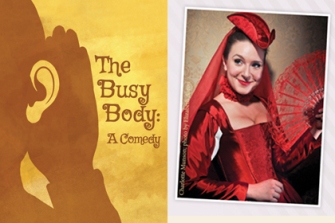Not entirely by accident, I recently stumbled upon an 1808 printing of Susanna Centlivre’s The Busy Body (1709) in a volume drawn from productions of that play by the Drury Lane and Covent Garden Theatres. The printing, coming roughly 100 years after the play was first produced in 1709, drew me in with scholarly fascination. Equally as interesting, though, was the preface (“Remarks”) written by Elizabeth Inchbald, the English dramatist and novelist who lived from 1753-1821. In this preface, she outlines Centlivre’s biography as she knew it and touched on the issues of women, their occupations in fields that had once excluded them, and the necessity of doing what one can to survive.
When a man follows the occupation of a woman, or a woman the employment of a man, they are both unpleasing characters, if they are guided in their pursuits by choice. But, if necessity has ruled their destinies, they are surely objects of compassion; and mercy should be granted to their want of skill in their irregular departments.
The female author of “The Busy Body” was driven to a poet’s calling, by the hardships of her fate…
The authoress of this play was at twelve years of age an orphan; and at fifteen, being persecuted on account of her poverty and her beauty, as much as her father had been for his religious and republican principles [her father had sided with the Puritans during the English Interregnum]
–Elizabeth Inchbald
Centlivre (nee Freeman) married three times, the first time at age 16 to “the nephew of Sir Stephen Fox” who died after only one year of marriage. After Fox’s death, Inchbald indicates that she quickly married a Mr. Carroll, who was unfortunately killed in a duel the next year. “Mrs. Carrol became an actress,” Inchbald wrote, “but notwithstanding her youth, her wit, and her beauty, she was unsuccessful in that profession.”
To avoid the alternative, female profligacy, or domestic drudgery, she now encountered the masculine enterprise of an author. She wrote eighteen plays, of which three will preserve her memory. These are The Wonder, Bold Stroke for a Wife, and the present comedy. [The Busy Body]
In this period of her writing, (and, no doubt, its concomitant, fasting)—the reader will not be surprised that Mrs. Carrol should marry a third time.—She now united herself to a man, whose very title promised her protection from that ancient and modern visitation upon authors … hunger. Mr. Centlivre was a “yeoman to the mouth,” or principal cook to queen Anne.
Mrs. Centlivre’s forecast in these her last nuptials did her judgment more honor than her ambition. She died in 1723, of a disorder, neither so lingering, nor so painful, as starving.
–Elizabeth Inchbald
 Clarence Brown Theatre’s production of The Busy Body in the Carousel Theatre, directed by John Sipes, (adaped by Sipes and Misty Anderson) opens this Friday, February 24, and runs through Sunday, March 12. Tickets
Clarence Brown Theatre’s production of The Busy Body in the Carousel Theatre, directed by John Sipes, (adaped by Sipes and Misty Anderson) opens this Friday, February 24, and runs through Sunday, March 12. Tickets
Read Anderson’s article “Susanna Centlivre: the Tina Fey of the Eighteenth Century”
In true Restoration comedy style, the names of the characters tell you a lot. The cast includes Jeff Dickamore (Sir George Airy), Brian Mani (Sir Francis Gripe), Terry Weber (Sir Jealous Traffick), Charlotte Munson (Miranda), Lauren Pennline (Isabinda), Jude Carl Vincent (Charles), Emily Kicklighter (Patch), Aaron Orlov (Whisper), Charles Pasternak (Marplot), Carlène Pochette (Scentwell), and Miguel A. Faña, Preston Alexander Raymer, and Scott Serro as servants.
The scenic design is by Nevena Prodanovic; lighting design by John Ambrosone; costume design by Marianne Custer; and sound design by Maranda DeBusk.







